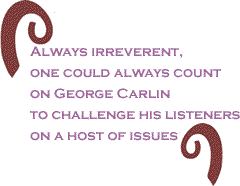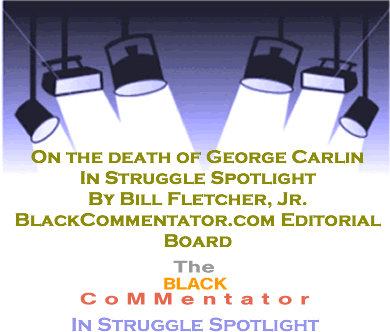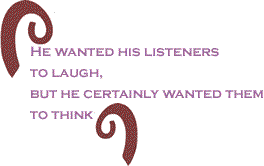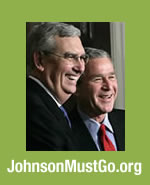
|
||||||||||||||||||||||
 |
||||||||||||||||||||||
 |
||||||||||||||||||||||
 |
||||||||||||||||||||||
 |
||||||||||||||||||||||
 |
||||||||||||||||||||||
 |
| The current issue is always free to everyone |
|
|
 |
I turned on the TV this morning only to hear that one of my favorite comedians, George Carlin, had died at the age of 71, apparently from a heart attack. I was stunned and very saddened. I feel as if I have grown
up with George Carlin. Always irreverent, one could always count
on George Carlin to challenge his listeners on a host of issues.
He could sound like a Black man, yet I never felt condescended
to through his mannerisms or comedy, in part because he seemed
to ‘get’ so much about the construction of race in the I was always worried that Carlin would die before his time. His life was something akin to a high speed “Funny Car “ that takes off and can blow up before it reaches the finish line (as happened, quite ironically, this past weekend in a race). Carlin led the fast life and worked his body over. Alcohol, cocaine plus an intense schedule certainly shortened his life. Yet, George Carlin did not quite seem to age. Certainly he aged physically, but there was something almost eternally youthful about him. In a segment of a past
interview broadcast upon his death this morning, Carlin noted
that he always judged the line in terms of what was acceptable
comedy, and then made a conscious effort to cross it! This was
the quintessential Carlin.
I will certainly miss George Carlin. There was a rare niche that he and comedians such as Richard Pryor have occupied, a niche that is very difficult to fill. BlackCommentator.com
Executive Editor, Bill Fletcher, Jr., is a Senior
Scholar with the Institute for Policy Studies,
the immediate past president of TransAfrica Forum and co-author of the just released book,
Solidarity Divided: The Crisis in Organized Labor and a New Path
toward Social Justice |
Any BlackCommentator.com article may be re-printed so long as it is re-printed in its entirety and full credit given to the author and www.BlackCommentator.com. If the re-print is on the Internet we additionally request a link back to the original piece on our Website. Your comments are always welcome. eMail
re-print notice
If you send us an eMail message we may publish all or part of it, unless you tell us it is not for publication. You may also request that we withhold your name. Thank you very much for your readership. |
|
| June
26, 2008 Issue 283 |
|
| Executive Editor: Bill Fletcher, Jr. |
| Managing
Editor: |
| Publisher: Peter Gamble |
| Est. April 5, 2002 |
| Printer Friendly Version in resizeable plain text format or pdf format. |
 |
 |
 |
| |
| |
























 The
courage to cross that line is what made him not only a comedian
but an expert political satirist. No wonder he was the recipient
of the Kennedy Center Mark Twain Prize for American Humor, an
honored bestowed on him just before his passing.
The
courage to cross that line is what made him not only a comedian
but an expert political satirist. No wonder he was the recipient
of the Kennedy Center Mark Twain Prize for American Humor, an
honored bestowed on him just before his passing.








